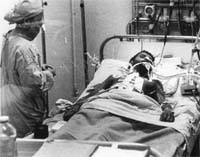No heartaches
 heart disorders are responsible for the greatest number of annual deaths worldwide. In the us, for instance, as many as 80,000 people undergo major heart surgery every year, and experts predict a continual rise in this figure as the population ages. Moreover, many of these patients succumb, not because of their faulty hearts, but because of what doctors call "complement cascade", an immune reaction. "This is a significant problem," says heart surgeon Harold Lazar, lead researcher at Massachusetts-based Boston University. "It can lead to further complications, longer hospital stays and even death," he says.
heart disorders are responsible for the greatest number of annual deaths worldwide. In the us, for instance, as many as 80,000 people undergo major heart surgery every year, and experts predict a continual rise in this figure as the population ages. Moreover, many of these patients succumb, not because of their faulty hearts, but because of what doctors call "complement cascade", an immune reaction. "This is a significant problem," says heart surgeon Harold Lazar, lead researcher at Massachusetts-based Boston University. "It can lead to further complications, longer hospital stays and even death," he says.
But now, survival prospects for people who have had heart surgery could be improved drastically, thanks to a genetically engineered human protein.Lazar and his colleagues at the University have found that the protein, called soluble human complement receptor type 1 or scr1, blocks the complement cascade. In tests carried out so far on pigs, scr1 has dramatically improved the animals' recovery. Complement cascade is a crucial part of the immune system that steps in to dispatch the invading microorganisms while the cells of the immune system ready themselves for the battle. The cascade is usually triggered by the blood circulating through the heart-lung machine that takes over the functions of the patient's heart and lungs as theses are stopped temporarily during the surgery. The presence of foreign particles or cells marked by antibodies can set off the reaction. Even the use of biocompatible tubing has failed to stop it.
The chemical process in complement cascade involves at least 20 glycoproteins that are activated in sequence. The adhesion of one complement protein results in the catalysis or addition of another on the cell's surface. Eventually, a protein structure called the membrane attack complex forms on the cell surface, causing the cell to burst. Complement cascade also activates certain immune cells that release free radicals that cause tissue damage. The scr1 blocks a glycoprotein called c3, a vital player in the cascade. Blocking this interrupts the cascade, preventing further tissue damage.
